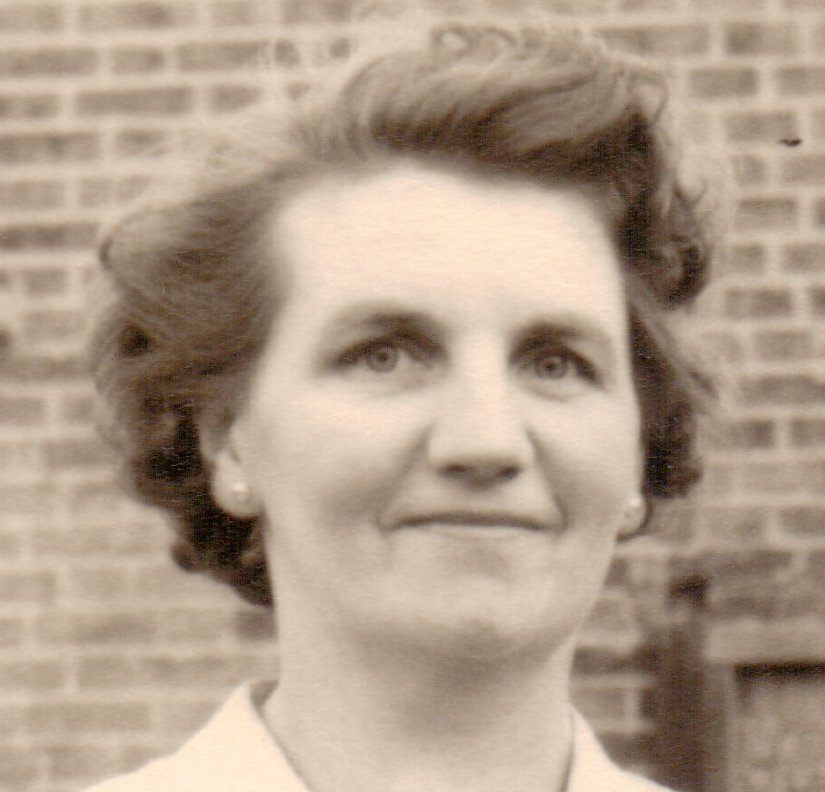About the author¶
Norah Brohan was born Norah Imrie, in Edinburgh on 8th September 1919, joining older twin brothers Jack and Dan. The family moved to London where her father Duncan, an artistic blacksmith, found work. Norah developed a lifelong love of London: They lived in Westminister in Great Peter Street, all learned to swim and dive in the municipal pool, and got a good education in Millbank school. Whenever there were processions or parades for royalty or visiting dignitaries, their mother kept them off school to watch. Her younger brother Vic joined the family in 1926.
Norah’s education finished on her 14th birthday. She was attending grammar school, having passed the exams, but family circumstances would not stretch to continuing her education. She went into service as a maid, gradually being promoted until she became the cook. Her days in service gave her a window on a different world, where she often accompanied the families she worked for to Scotland for the shooting.
She left service, at age 20, to marry Joseph Brohan, settling down in Leytonstone near Epping Forest. On her 21st Birthday she and Joe were out shopping for a necklace in Stratford but had to take shelter as the first air raid of the war devastated East London. Hours later they could still see the docks burning. She survived the blitz in London and coped with all the difficulties of war even after first Paul and then John were born - until the doodlebugs came. Trying to get two toddlers to listen for the engines of the doodlebugs cutting out and run for shelter proved beyond endurance; so she evacuated her little family to Uncle Wik’s house at Cuxton in Kent. She stayed there for the rest of the war; her daughter Anne was born in 1945 and Margaret in 1946.
The family returned to a London house with no glass in the windows or plaster on the walls, just in time to experience the coldest winter on record - 1946/47. But gradually things got back to normal and the children enjoyed very happy childhoods, with encouragement in learning and plenty of books from the library to read. They visited all the London museums regularly and went to the seaside at Chalkwall on sunny summer days. Walks in Epping Forest were a weekly occurrence and trips to Uncle Wick’s farm in Cuxton were frequent. As the children grew older they ventured off in pairs to stay with Joe’s family in Ireland for a few weeks over the summers. They were always warmly welcomed and had great fun.
Norah gently steered her children through grammar school and further and higher education, with a wider than usual education raising rabbits and chickens for meat and keeping bees. The garden in Leytonstone was long, and vegetables, fruit, and walnuts were grown, harvested, preserved, and pickled. Building projects were all inclusive and the children all learned to mix cement, use a spirit level, and generally assist with the project in hand. Norah lightened the workload with her great sense of humor and often had the family in stitches. She got the children to work with “a mad half hour and we will- get the house cleaned, get the garden weeded, move sand and cement.” Norah didn’t believe in gender discrimination in jobs: Both boys and girls had to learn to cook, sew, and iron clothes.
Norah worked with Joe’s sister Mary who ran her beauty business in Mayfair, and then in a job she loved in the West Ham Housing Department. There she would hear the problems of homeless families, and match them up with homes rebuilt in West Ham or in the new towns around London. As the children left home she developed hobbies in machine knitting and creative writing.
Norah and Joe moved to Worcestershire in 1985 to be near Paul and Margaret and their families. It was quite a wrench leaving London after 50 years in the same house; but the new allotment and the knitting club vied with a large beautiful garden and seven grandchildren close to hand in keeping them both busy. Her brother Jack came to live around the corner and daily coffee gatherings were great fun.
After Jack died and Joe became ill with Alzheimers, Norah and Joe moved to Worcester to live in a flat in Paul’s house. Norah continued to live there after Joe’s death, and gradually began to join in all that Worcester had to offer: She went on daily shopping and coffee trips, club outings and group holidays, and thoroughly enjoyed life once more. She stayed at the centre of an extended family until she died on 22nd January 2018. She was 98 and felt she had had “a lovely life.”
Noran Brohan was my Mum. A warm supportive woman with very strong family values. In addition to being a great wife, mum, grandma, and great grandma, she was also a very determined woman with a strong sense of right and wrong. She was very interested in people and the world around her. Till the end she wanted to know what was going on in the world and had decided opinions on how things should work.
- Anne Brohan
